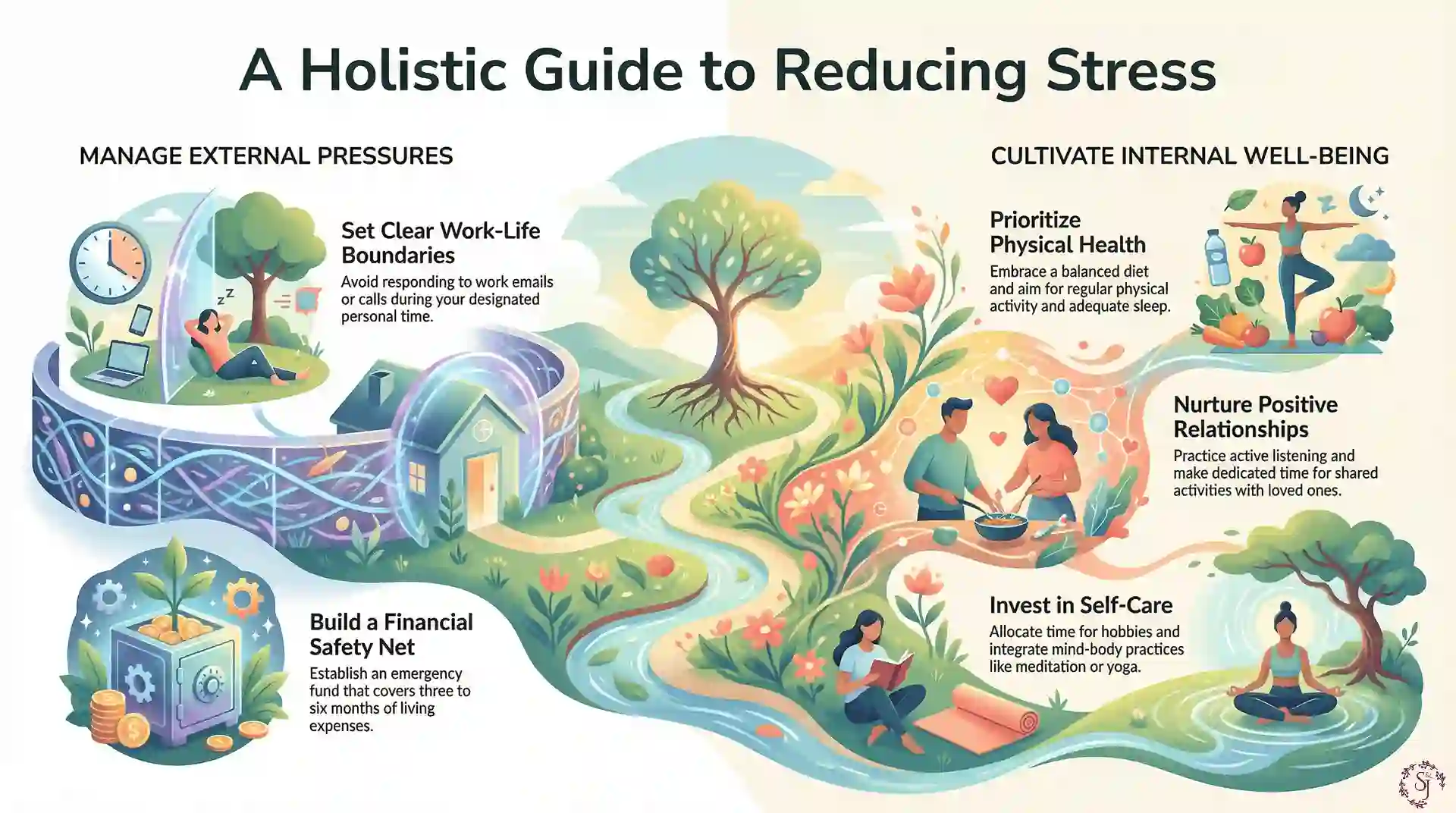
How to Reduce Stress in Each Aspect of Your Life
Reducing stress in various aspects of life is crucial for maintaining overall well-being and improving quality of life. By addressing stressors in different areas of life and implementing effective strategies, individuals can achieve a greater sense of balance and resilience. Let’s explore how to reduce stress in key life areas:
1. Work and Career

This infographic simplifies how to reduce stress in life by breaking it down into manageable areas like work, health, relationships, and personal care. It highlights small, consistent habits that build long-term emotional balance and mental clarity. Use it as a quick reference to identify where stress builds up and how to address it effectively.
Time Management:
Task prioritization entails recognizing urgent and significant tasks, establishing deadlines, and deconstructing extensive projects into smaller, achievable increments. Employ tools like to-do lists, calendars, or time-tracking applications to streamline task organization and optimize time allocation. Explore productivity methodologies such as the Pomodoro Technique, which entails concentrated work periods interspersed with brief breaks to amplify effectiveness.
Healthy Boundaries:
Establish clear boundaries between work and personal life to reduce work-related stress from spilling over into leisure time in life. Make it clear that you are not available outside of work hours and avoid responding to work-related emails. Or calls during designated personal time.
Communication:
Effective communication in the workplace involves actively listening to others. Then expressing thoughts and concerns clearly and respectfully, and providing constructive feedback. Practice assertive communication techniques, such as using “I” statements. And expressing needs and boundaries assertively while respecting the perspectives of others. Address conflicts or misunderstandings promptly and directly, seeking mutually beneficial solutions and maintaining professionalism throughout the process.
Mindfulness:
Sometimes putting mindfulness practices into your daily routine can create calm and focus amidst work-related pressures. Practice mindfulness meditation techniques, such as mindful breathing or body scan exercises, which can sometimes reduce stress and enhance concentration. Take short breaks throughout the workday to step away from your desk, stretch, and practice mindfulness exercises to refresh your mind and boost productivity.
Seek Support:
Reach out to supportive colleagues, mentors, or professional counselors for guidance and encouragement during challenging times in the workplace. Participate in workplace support groups or employee assistance programs that offer resources. And support for managing stress, work-related issues, or personal concerns. Consider seeking career coaching or mentorship to develop strategies for career advancement, skill development, or navigating work-related challenges effectively.

2. Relationships
Effective Communication:
Demonstrate active listening by fully engaging with the speaker. Use “I” statements to express thoughts, feelings, and needs assertively without placing blame or making assumptions. Practice empathy by acknowledging the perspectives and feelings of others, even in moments of disagreement or conflict.
Conflict Resolution:
Approach conflicts with a mindset of collaboration and problem-solving rather than defensiveness or aggression. Use constructive communication techniques, such as “I” statements, active listening, and seeking common ground, to address conflicts respectfully and find mutually acceptable solutions. Consider seeking mediation or professional guidance when conflicts escalate or persist despite attempts at resolution.
Quality Time:
Make time for shared activities with loved ones to strengthen bonds and foster connection. Schedule regular family meals, outings, or game nights to create opportunities for quality time and shared experiences. Prioritize spending time with loved ones in a way that everyone enjoys to nurture relationships and create lasting memories.
Set Boundaries:
Establish clear boundaries with family members, friends, or romantic partners to protect personal time, energy, and emotional well-being. Express your needs, preferences, and boundaries openly and assertively, while also honoring the limits of others in return. Practice self-care and prioritize your own well-being by saying no to requests or commitments that exceed your capacity or compromise your values. For example looking after an older people relative can be rewarding and within your limits to begin with, but as their needs increase it can be easy to get out of your depth quickly. Establishing time frames and looking into respite or full time care at homes like wellingtonhallcarehome.co.uk can help you and your relative.

3. Health and Wellness
Regular Exercise:
Participate in physical activities that bring you joy, like walking, jogging, dancing, or swimming, to enhance physical well-being and alleviate stress. Incorporate exercise into your daily routine by scheduling regular workouts, taking active breaks throughout the day, or participating in group fitness classes. Establish achievable fitness objectives and monitor your advancement to sustain motivation and dedication to an active way of life.
Healthy Eating:
Embrace a well-rounded diet filled with fruits, vegetables, whole grains, lean proteins, and healthy fats to nurture your overall health and wellness. Strategize your meals and snacks ahead of time to guarantee nutritious selections and steer clear of processed or convenient options. Cultivate mindful eating habits by tuning into hunger and fullness signals, relishing the tastes and textures of your food, and minimizing distractions during meals.
Adequate Sleep:
Minimize exposure to screens, caffeine, and stimulating activities before bedtime to encourage relaxation and prepare your body for restorative sleep. Engage in relaxation practices like deep breathing, meditation, or progressive muscle relaxation to unwind and facilitate the transition into a peaceful sleep.
Stress-Relief Techniques:
Discover stress-relief methods like deep breathing exercises, guided imagery, or progressive muscle relaxation to soothe both the mind and body when facing stress. Incorporate relaxation activities into your daily routine, such as yoga, tai chi, or mindfulness meditation, to promote relaxation and reduce tension. Experiment with aromatherapy, herbal teas, or soothing music to create a tranquil environment and enhance relaxation and reduce stress in life.
Read More: 6 Improvements to Boost Your Confidence & Sense of Self Worth
Seek Professional Help:
If stress persists or significantly impacts your daily functioning, seek support from healthcare professionals, such as therapists, counselors, or psychiatrists to reduce stress in life. Investigate therapy possibilities like cognitive-behavioral therapy (CBT), mindfulness-based stress reduction (MBSR), or relaxation therapy to cultivate coping skills and techniques for proficiently handling stress. Consider medication or other medical interventions under the guidance of a healthcare provider if stress-related symptoms require additional support or treatment.

4. Finances
Budgeting:
Track your spending regularly and adjust your budget as needed to align with your financial goals and values. Utilize budgeting tools, apps, or spreadsheets to monitor your finances and identify opportunities for saving or reducing expenses.
Emergency Fund:
Establish an emergency fund that covers three to six months’ worth of living expenses to provide a financial safety net during unexpected circumstances or emergencies. Regularly add to your emergency fund by allocating a portion of your monthly income and refraining from unnecessary expenses or impulsive purchases.
Debt Management:
Craft a debt repayment strategy that gives precedence to high-interest debts like credit card balances or payday loans, ensuring minimum payments are met on other debts. Explore debt consolidation methods such as balance transfers or consolidation loans to merge multiple debts into a more manageable single payment. Engage in negotiations with creditors or lenders to adjust repayment terms, lower interest rates, or investigate hardship programs if financial challenges or payment difficulties arise.
Financial Education:
Empower yourself with knowledge on personal finance matters, including budgeting, saving, investing, and retirement planning, to make well-informed financial choices. Seek out reputable sources of financial information, such as books, websites, or workshops, that provide practical guidance and strategies for managing money effectively. Consult with financial advisors or professionals for personalized advice and recommendations tailored to your specific financial goals, circumstances, and risk tolerance.
Seek Support:
If financial stress becomes overwhelming or unmanageable, seek support from financial advisors, credit counselors, or support groups for guidance and assistance. Explore resources and programs offered by nonprofit organizations, government agencies, or community centers that provide financial education, counseling, or assistance with debt management or budgeting. Reach out to family members, friends, or trusted individuals for emotional support, encouragement, and accountability as you navigate financial challenges or work towards financial goals.

5. Personal Growth and Self-Care
Self-Reflection:
Set aside time for self-reflection and introspection to explore your values, beliefs, strengths, weaknesses, and personal goals. Journaling, meditation, or mindfulness practices can facilitate self-awareness and deepen your understanding of yourself and your aspirations. Reflect on past experiences, successes, challenges, and lessons learned to gain insights and perspective on your personal growth journey.
Hobbies and Interests:
Allocate time to hobbies, interests, and pursuits that evoke joy, fulfillment, and purpose in your life. Delve into new activities or revisit past passions to uncover avenues for creativity, exploration, and self-expression. Forge connections with kindred spirits by engaging with clubs, classes, or groups aligned with your interests, fostering a sense of camaraderie and shared enthusiasm.
Mind-Body Practices:
Integrate mind-body disciplines like meditation, mindfulness, yoga, or tai chi into your everyday schedule to foster relaxation, alleviate stress, and nurture overall well-being. Engage in deep breathing exercises, body scans, or guided imagery to quiet the mind, diminish anxiety, and foster inner tranquility. Explore mindfulness-focused programs, workshops, or retreats to enhance your practice and embed mindfulness across different facets of your life.
Boundaries:
Establish clear boundaries with yourself and others to protect your time, energy, and emotional well-being. Communicate your boundaries assertively and respectfully, and be willing to enforce them consistently to maintain personal integrity and self-respect. Practice self-care and prioritize your own needs and well-being, even if it means saying no to others or setting limits on your commitments and obligations.
Positive Relationships:
Cultivate positive relationships with supportive individuals who uplift, encourage, and inspire personal growth and well-being. Surround yourself with people who share your values, aspirations, and interests, and who support you in pursuing your goals and dreams. Invest time and effort into nurturing and maintaining meaningful connections with family, friends, mentors, and role models who contribute to your happiness, fulfillment, and overall sense of belonging.
Read More: 7 Signs of Stress You Shouldn’t Ignore
Conclusion
Mitigating stress across all life domains demands a comprehensive and proactive method that attends to physical, emotional, social, financial, and personal wellness. Through deploying efficient techniques like time management, adept communication, self-care routines, and seeking assistance when warranted, one can fortify resilience, cope with stressors proficiently, and attain enhanced equilibrium, contentment, and wellness. Bear in mind that stress management is an ongoing endeavor necessitating self-awareness, dedication, and adaptability while traversing life’s trials and avenues for development.

